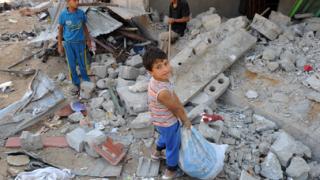
As part of a group of UK non-governmental organisations, UNA-UK has written to the Foreign Secretary to express concern over the use of explosive weapons in populated areas. This is part of an international action coordinated by the International Network on Explosive Weapons (INEW) in which letters have also been sent to UN Secretary-General Ban Ki-moon and to the Permanent Representatives of the 15 member states of the Security Council.
Against the background of high levels of civilian casualties and widespread destruction from artillery, rockets and airdropped bombs in the towns and cities of Gaza, Syria and Ukraine, the letters call for an international commitment to prevent the use of explosive weapons with wide area effects in populated areas. These situations are the most recent examples of a predictable pattern of harm caused when heavy explosive weapons are used in populated areas. Suffering as a result of such weapons use has also been seen in Côte d’Ivoire, Iraq, Lebanon, Libya, Somalia, Sri Lanka, and elsewhere in recent years.
The International Network on Explosive Weapons has been working to highlight the problems posed by the bombing and bombardment of towns and cities and to date around 40 countries have recognised this as a specific humanitarian problem that should be addressed. Many countries have welcomed the UN Secretary-General’s recommendation that states should “avoid using explosive weapons with wide-area effect in populated areas.” The UK however, has declined to speak out on this issue.
Discussions internationally on this topic have largely taken place in the context of the UN Security Council debates on protection of civilians, but expert meetings in London and Oslo in the past 12 months have begun to identify specific policies and practices to prevent harm to civilians. These efforts will continue in the coming months, with the UN Office for the Coordination of Humanitarian Affairs compiling a set of existing practices by which states prevent harm to civilians from the use of explosive weapons. Building on these practices, INEW is calling for states to make an international commitment to prevent the use of explosive weapons with wide area effects in populated areas.
Upcoming opportunities for the UK and other states to express concern about the use of explosive weapons in populated areas include:
- the UN Security Council Open Debate on Children and Armed Conflict on 8 September in New York;
- the UN General Assembly’s high level segment in September in New York; and,
- the UN General Assembly’s First Committee in October in New York.
As well as UNA-UK, the letter was signed by representatives of Action on Armed Violence, Article 36, Islamic Relief, Saferworld, Save the Children and Soroptomists International.
Image: Palestinians Search through Rubble in Gaza, 6 August 2014 (c) UN Photo/Shareef Sarhan






